Collateral Support
Members can satisfy Margin Requirements by depositing
Eurex Clearing accepts approximately 10.000 Securities that are also admissible as Collateral for the European Central Bank or the Swiss National Bank. On top, approx. 850 Government Bonds from Non-EU countries (AU, CA, JP, US) and selected Equities.
SECURITY COLLATERAL
BONDS
What are maturity criteria for Bonds?
- Minimum maturity:
> 15-days to maturity for all denomination currencies - Maximum maturity:
< 10Y for PLN
< 30Y for CHF, DKK, JPY, NOK, SEK
< 50Y for AUD, CAD, EUR, GBP, USD
What are the criteria for acceptance of Unsecured Bank Bonds?
- Eurex Clearing accepts unsecured Bank Bonds with external issuer rating above approximately “BBB+” and at the same time admissible as Collateral for the European Central Bank or the Swiss National Bank.
- Please find more information regarding the exclusion here:
Eurex Clearing Circular 001/2017
Is there a concentration limit for Bond Collateral?
- Clearing Members can pledge no more than 25% of the issued capital per ‘Issue’

- Please find more information regarding Credit-, Concentration- and Wrong-Way Risk here:
Eurex Clearing Circular 035/2025.
Is there a Limit for allocated Securities in GC Pooling® Baskets?
- Eurex Clearing sets the Limit of no more than 1 bn EUR for allocated Securities in all GC Pooling® Baskets issued by SAREB.
- Please find more information regarding the Limit for allocated Securities in all GC Pooling® Baskets here:
- SAREB: Eurex Clearing Circular 083/2014
What is the coupon structure of the theoretical valuation Model?
- Eurex Clearing applies Haircuts on every instrument for collateralization purposes, which are calibrated to guarantee the high (99.9 percent) confidence level for extreme market conditions.
However, next to these Haircuts reliable Bond prices are essential for determining Collateral values.
Eurex Clearing uses confidence factors for each theoretical price which accounts for uncertainties arising from the appliance of any theoretical pricing model.
Thus, only Bonds where theoretical prices can be calculated are eligible as Bond Collateral. - They have the following coupon structures:
- Non-callable fixed rate Bonds with zero or non-zero coupon
- Non-callable floating rate Bonds, which refer to a single reference curve with constant structure (i.e. they do not switch between fixed and floating coupons)
- Non-callable reverse floating rate Bonds with constant structure
- Please find more information regarding Collateral Valuation here:
Homepage and Eurex Clearing Circular 094/2011
What are the liquidity criteria for Bonds?
- Bonds need to exhibit sufficient liquidity (e.g. reasonable availability of quotes, issued volume).
EQUITIES
What are the general criteria for acceptance of Equities?
- Equities have to be constituents of the following Indices:
- DAX 40®
- EURO STOXX 50®
- SMI®
What is the concentration limit for Equities?
- The ‘Equity ratio’ in the Collateral Pool must not exceed a rate of more than 30 % as a threshold.
- The Admissible proportion of the free float is 1%.

- Please find more information regarding Credit-, Concentration- and Wrong-Way Risk here:
Eurex Clearing Circular 035/2025.
CASH COLLATERAL
Which currencies are accepted by Eurex Clearing?
- Eurex Clearing accepts four currencies as Cash Collateral:
- EUR
- CHF
- GBP
- USD
- JPY
- You can find respective currency information here.
What are the interest rates on Cash Collateral?
- Interest rates on Cash Collateral are in principle calculated based on a predefined benchmark rate per currency.
- Find more Information here and also in the Member Section under:
Resources’ / ‘Collateral Data – Deposit Rates’
FAQ
There are three relevant types of risk:
- Credit Risk: potential loss one party may suffer if the Counterparty fails to fulfil the contractual obligations arising from its transactions.
- Concentration Risk: potential loss which Eurex Clearing may suffer during the Default Management Process, due to an insufficient diversification with respect to the Counterparty’s Collateral Pool and transactions.
- Wrong-way Risk: potential loss which Eurex Clearing may suffer during the Default Management Process, due to an unfavorable interrelatedness between the Counterparty’s creditworthiness, the value of its Collateral Pool and the value of its portfolio.
Find more Information here.
- The complete list of accepted Collateral can be found on our Homepage.
Please see the ‘Collateral Acceptance and Haircuts’ file, under ‘Risk Parameters and Initial Margins’, section ‘General Parameters’:
- In the ‘Admissible Securities’ file, published on the website under ‘Risk Parameters and Initial Margins’, section ‘General Parameters’.
No. Bank Guarantees are not eligible as Collateral.
No. Gold is not eligible as Collateral.
No. ETFs are not eligible as Collateral.
Download here : Identification of Initial Margins
Contacts
Eurex Clearing AG
Helpdesk Derivatives Clearing
Service times from 01:00 – 22:30 CET
(no service on Saturday and Sunday)
T +49-69-211-1 12 50
F +49-69-211-1 43 34
Eurex Clearing AG
CCP Risk Management / Risk Exposure Management
Service times from 01:00 – 22:30 CET
(no service on Saturday and Sunday)
T +49-69-211-1 24 52
F +49-69-211-1 84 40
